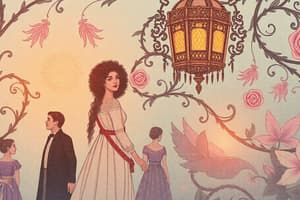Podcast
Questions and Answers
According to Nairn (1988), how has the monarchy successfully converted much of the modern mass media to its cause?
According to Nairn (1988), how has the monarchy successfully converted much of the modern mass media to its cause?
- By emphasizing the importance of the individual within the institution.
- By promoting the Queen as a role model and a symbol of hope in the modern world.
- By using royal events, such as weddings and funerals, to reinforce the sense of national unity. (correct)
- By emphasizing the importance of tradition and continuity, which the monarchy embodies.
- By portraying the Queen as the ultimate symbol of national identity. (correct)
The media tend to portray the upper class in a critical light, highlighting their often excessive wealth and their lack of contribution to society.
The media tend to portray the upper class in a critical light, highlighting their often excessive wealth and their lack of contribution to society.
False (B)
According to pluralists, representations of the rich are justified because they motivate people that if they work hard and they will achieve.
According to pluralists, representations of the rich are justified because they motivate people that if they work hard and they will achieve.
True (A)
How does the media's portrayal of the working class often present a problem, according to Newman (2006)?
How does the media's portrayal of the working class often present a problem, according to Newman (2006)?
The media representation of the working class consistently focuses on their moral panics and the challenges they face in their everyday lives.
The media representation of the working class consistently focuses on their moral panics and the challenges they face in their everyday lives.
Research suggests that the media portrayal of the most destitute sections of society, often labeled as ‘chavs’, is a realistic representation of their lives and struggles.
Research suggests that the media portrayal of the most destitute sections of society, often labeled as ‘chavs’, is a realistic representation of their lives and struggles.
According to Cohen (2009) and MacDonald (2007), the media is a powerful tool that can help improve the experience of the poor by drawing attention to their hardships and advocating for social change.
According to Cohen (2009) and MacDonald (2007), the media is a powerful tool that can help improve the experience of the poor by drawing attention to their hardships and advocating for social change.
What is the main argument regarding media representations of poverty and the underclass, according to the text?
What is the main argument regarding media representations of poverty and the underclass, according to the text?
The media's representation of age, particularly that of the elderly, is becoming more comprehensive and representative of the diverse experiences of aging.
The media's representation of age, particularly that of the elderly, is becoming more comprehensive and representative of the diverse experiences of aging.
Which of the following stereotypes is often applied to the elderly in media? (Select all that apply)
Which of the following stereotypes is often applied to the elderly in media? (Select all that apply)
Flashcards
Media Representation of Royalty
Media Representation of Royalty
Media portrayals of royalty often strengthen national identity, showcasing them as national symbols.
Upper Class Media Portrayal
Upper Class Media Portrayal
Media often depicts the upper class positively, implying they deserve their wealth, often ignoring wealth inequality.
Middle Class Media over-representation
Middle Class Media over-representation
The middle class is frequently highlighted in media, especially in TV dramas, often emphasizing a certain standard of living.
Working Class Negative Portrayal
Working Class Negative Portrayal
Signup and view all the flashcards
Poverty Media Stereotypes
Poverty Media Stereotypes
Signup and view all the flashcards
Media Stereotyping Children
Media Stereotyping Children
Signup and view all the flashcards
Youth Media Representation
Youth Media Representation
Signup and view all the flashcards
Media Portrayal of Elderly
Media Portrayal of Elderly
Signup and view all the flashcards
Media Stereotype of Elderly
Media Stereotype of Elderly
Signup and view all the flashcards
Media's Role in Social Class Representations
Media's Role in Social Class Representations
Signup and view all the flashcards
Media Impact on Social Class
Media Impact on Social Class
Signup and view all the flashcards
Media Impact on Age Representation
Media Impact on Age Representation
Signup and view all the flashcards
Limited Media Research
Limited Media Research
Signup and view all the flashcards
Study Notes
Media Representations of Social Class and Age
- Mass media representations of social classes rarely focus on class conflict. Some neo-Marxists suggest media aims to create cultural hegemony, encouraging acceptance of the dominant capitalist class's interests.
- Representations of the Very Rich (Celebrities/Monarchy): Media frequently portrays royalty positively, reinforcing national identity. Criticism of the monarchy was rare until 1997. Recent polls show public disinterest in royal weddings.
- Representations of the Upper Class and Wealth: Upper class and wealthy individuals often receive positive media portrayals. Pluralists argue these representations are justified as they inspire hard work and achievement. Marxists argue these portrayals mask inequalities in wealth & opportunities.
- Representations of the Middle Class: Middle class individuals and concerns are often overrepresented on TV and in media. Many newspapers and magazines target the middle class. The middle class tend to be anxious about moral decline. The middle class dominate positions of authority in some media.
- Representations of the Working Class: Media portrayals are often unflattering or pitying, labeling them with problems or as a social issue. When the working class is featured, organisations often focus on the subject of moral panics or are represented as a problem (e.g. welfare cheats, drug addicts). They are often presented as less intelligent or shallow.
- Representations of Poverty and Underclass: Portrayals of the poor are often negative and stereotypical, sometimes labeling some groups as "chavs". Some researchers suggest the media revels in the suffering of the poor and ignores systemic causes. Media may reinforce the popular view that the poor are responsible for their poverty.
- Age in Media Representations: Media representations of different age groups tend to generalize based on stereotypes, encouraging audiences to accept specific representations in terms of image and behavior as representative of whole groups.
- Representations of Childhood: UK media often portrays British children in positive ways, with recurring stereotypes including child victims of crime, cute, little devils, or brave. However, children from ethnic minorities may be underrepresented.
- Representations of Youth: A significant media industry targets youth for lifestyle marketing. However, youth are often represented as a social problem, potentially linked to a moral panic, through one-dimensional portrayals of negativity or anti-authority behaviour.
- Representations of the Elderly: Old age is often devalued in the media, particularly in advertising. The elderly are underrepresented across a range of media and are frequently stereotyped negatively, portrayed as grumpy, mentally challenged, infantile, or as a burden to society. Recent research suggests that this may be changing slightly as the elderly are recognised as a group with disposable income.
Stereotypes across the Lifespan
- Children: Victims of crime, cute, little devils, brave, intelligent, accessories, modern
- Youth: Negative moral judgements, anti-authority, problems, social/moral panics
- Elderly: Grumpy, mentally challenged, infantile, burden, sometimes as golden agers or active.
Studying That Suits You
Use AI to generate personalized quizzes and flashcards to suit your learning preferences.
Description
Explore how mass media shapes perceptions of different social classes and age groups. This quiz covers issues surrounding the portrayals of the wealthy, upper class, and middle class, as well as the implications of these representations on societal norms and values.




